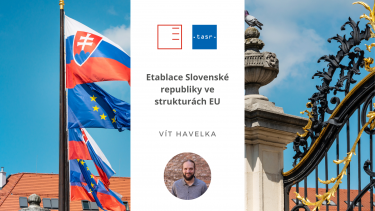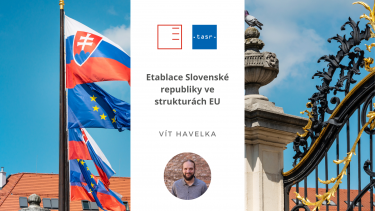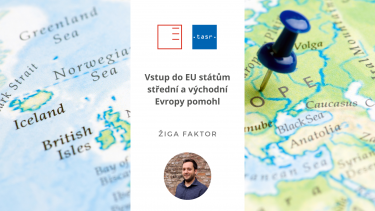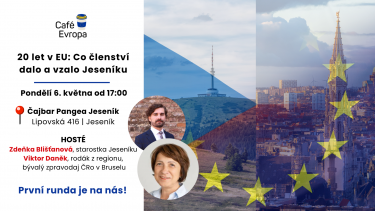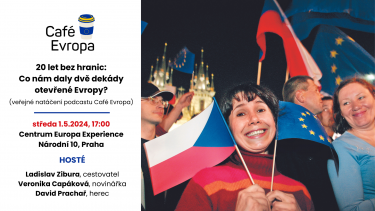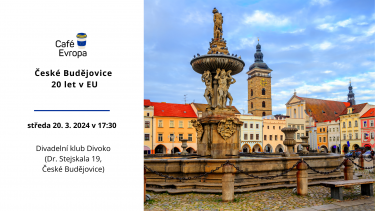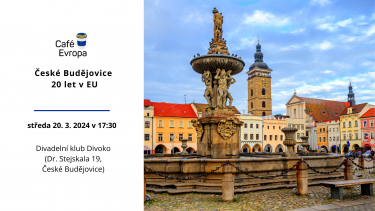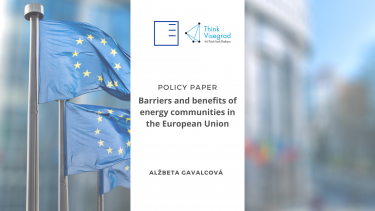TASR | Establishment of the Slovak Republic in the EU structures
Twenty years ago, the European Union underwent its biggest enlargement with the addition of ten Central and Eastern European countries. According to Vít Havelka, Senior Research Fellow at EUROPEUM Institute, this is enough time for all accession countries to learn how to navigate the EU institutions and its decision-making process.
Zjistit více
TASR | Etablace Slovenské republiky ve strukturách EU
Před dvaceti lety došlo k největšímu rozšíření Evropské unie o deset zemí střední a východní Evropy. To je podle Víta Havelky, seniorního výzkumného pracovníka Institutu EUROPEUM, dostatečná doba na to, aby se všechny přistupující země naučily pohybovat v institucích EU a jejím rozhodovacím procesu.
Zjistit více
TASR | EU accession helped Central and Eastern European countries
In 2004, a total of ten new countries joined the European Union, the largest enlargement in terms of population and number of countries. EU accession has helped the countries of Central and Eastern Europe, especially in terms of economic growth and political stabilisation. Žiga Faktor, Deputy Director of EUROPEUM Institute and Head of the Brussels Office, commented on this topic.
Zjistit více
TASR | Vstup do EU státům střední a východní Evropy pomohl
V roce 2004 se k Evropské unii přidalo celkem deset nových států, jednalo se o největší rozšíření co se počtu obyvatel a počtu zemí týče. Vstup do EU státům střední a východní Evropy pomohl, zejména v oblasti ekonomického růstu a politické stabilizace. K tomuto tématu mluvil pro TASR Žiga Faktor, zástupce ředitele Institutu EUROPEUM a vedoucí bruselské kanceláře.
Zjistit více
Café Evropa | 20 let v EU: Co členství dalo a vzalo Jeseníku?
Zveme vás na další debatu Café Evropa! Green Deal, migrace, bezpečnost, eurovolby, dotace z EU... Zajímá Vás, co z toho má Jeseník? Na tyto a další otázky, Vám odpoví naši hosté. Přijďte diskutovat!
Zjistit víceCafé Evropa | 20 years without borders: what have two decades of open Europe given us?
We invite you to a public recording of the Café Evropa podcast. Come and discuss twenty years of open Europe with representatives of the generation that has lived most of its life there, as well as those who remember the past regime and the waiting at the borders. What do you remember?
Zjistit víceCafé Evropa | 20 let bez hranic: Co nám daly dvě dekády otevřené Evropy?
Zveme Vás na veřejné natáčení podcastu Café Evropa. Přijďte diskutovat o dvaceti letech otevřené Evropy se zástupci generace, která v ni prožila většinu života, i se zástupcem té, která dobře pamatuje minulý režim a také čekání na hranicích. Na co vzpomínáte Vy?
Zjistit víceCafé Evropa: České Budějovice 20 years in EU
We invite you to the next debate of the Café Evropa series. Come and talk to us about what current european issues are resonating in České Budějovice and how you imagine Europe. Are you interested in nuclear energy, electromobility, euro, local projects supported by the EU, culture or any other european topics?
Zjistit víceCafé Evropa: České Budějovice 20 let v EU
Zveme Vás na další debatu ze série Café Evropa. Přijďte si s námi povídat o tom, jaká současná evropská témata rezonují v Českých Budějovicích a o tom, jak si Evropu představujete právě Vy. Zajímá vás jaderná energetika, elektromobilita, otázka přijetí eura, lokální projekty podporované EU, kultura nebo jakákoliv další evropská témata?
Zjistit vícePolicy Paper | Barriers and benefits of energy communities in the European Union
Energy communities are an effective means to decentralize and renew our energy systems with sustainable solutions as they are usually based on renewable energy. They have already started emerging in 1970´s, yet there has been a significant increase in their development only in recent years, also in terms of their introduction into the EU legislation. Especially in Western and Northern European countries the concept already enjoys vast popularity. On the other hand, in Central and Eastern European countries (further referred to as CEE) energy communities are only beginning to emerge. The policy brief (based on literature and interviews with various stakeholders ) examines the benefits energy communities may bring, and more importantly, the main obstacles remaining in their way for greater evolution in the CEE region – and especially Visegrad countries (V4). As these initiatives progress, sharing the best practices will ensure the success of the community energy in the energy transition. Writes Alžbeta Gavalcová.
Zjistit víceStaroměstské náměstí 4/1
Praha 1 - Staré Město
110 00
tel.: +420 212 246 552
email: europeum@europeum.org
https://www.europeum.org
